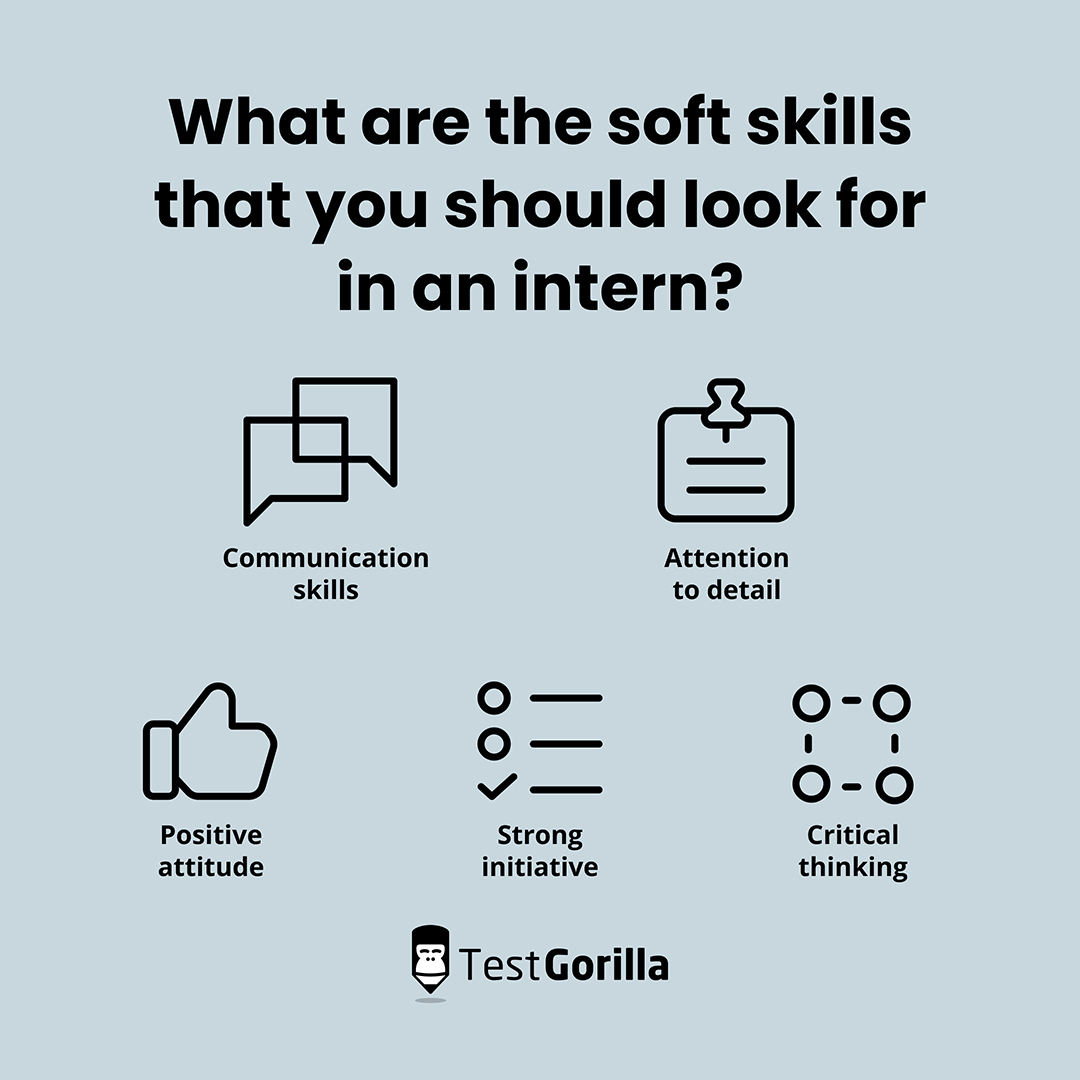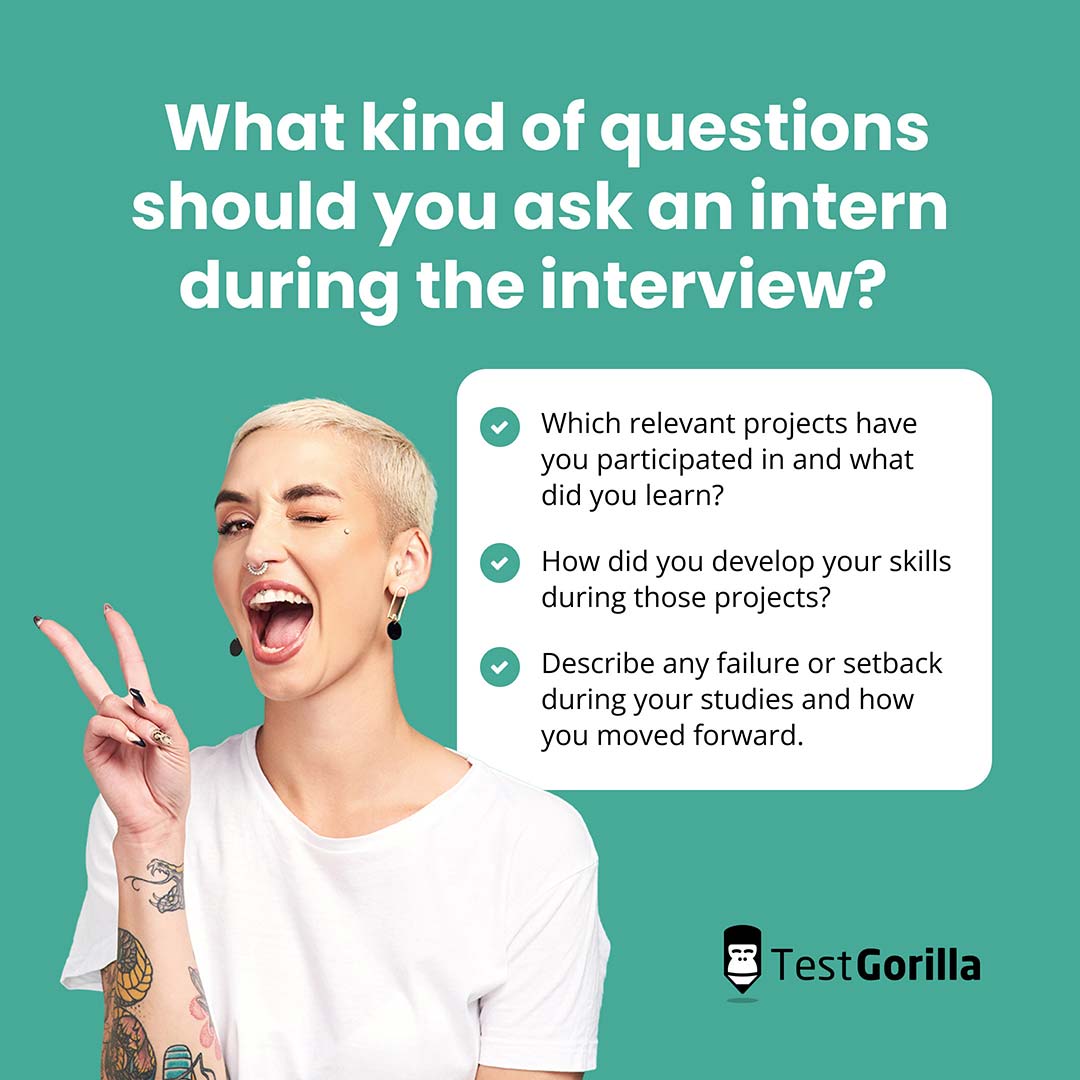There are many benefits of running an internship program. Hiring skilled interns will help you to raise employer brand awareness, gain new perspectives, and reduce the workload of your full-time employees.
To create a successful internship program, focus on meaningful tasks that will ensure growth both for your interns and your business.
No matter your industry, you'll need to carefully screen the potential interns. For this, you can use pre-employment tests to evaluate applicants’ skills and pick the best ones for each internship role.
Interns might not have a lot of professional experience, so it might make more sense to focus on soft skills such as communication and critical thinking, rather than on hard skills which they’ll learn on the job.
Below, we'll explain how to decide between paid and unpaid internship programs, what kind of skills you should look for, and how to use pre-employment testing to hire the best interns with ease.
Table of contents
- What's an intern?
- What kind of internship program suits your business most?
- Interns’ soft skills: What are the soft skills that you should look for in an intern?
- Interns’ hard skills to look for
- How to test your interns’ skills
- How to create an effective job description for interns
- How much does an intern cost?
- Intern interview questions: What kind of questions should you ask during the interview?
- Hiring an intern is easy when know how to evaluate their skills
What's an intern?
An intern is an employee who works in a temporary entry-level position who also receives on-the-job training and assists the existing team with various tasks. Companies often hire as interns undergraduate or graduate students who want to gain real-life workplace experience and see whether a specific career suits them well.
An internship program is an excellent way to see how interns work and whether they fit in your company; at the end of their internship, you can hire the best performers as your full-time employees.
To effectively gauge their skills, make sure that your interns know what their objectives are and how they can contribute to the overall success of your business. Nobody wants to be a gofer!
To hire a talented intern, you need to identify what the desired candidates would bring to the table, how you would measure their performance, and what kind of compensation terms you can offer.
Keep in mind that due to a lack of experience, interns might not have specialized technical skills; instead, look for the ones who are motivated to succeed. Positivity and grit will enable the best interns to quickly learn the ropes and add value to your business.
As a rule of thumb, you'd be better off with candidates who demonstrate attention to detail, curiosity, and willingness to learn. Don't bet on those who try to wing it. To identify the best candidates, consider using skills tests and running a structured interview campaign.
What kind of internship program suits your business most?
Most companies go for an on-site placement when hiring interns, because it allows the team to communicate with them effectively and help them learn the necessary skills for the job. Some roles may permit remote placements, but even then your business might benefit more from recruiting a full-time, in-house intern.
You can also choose between running paid and unpaid internships. Paid internships might be the more ethical choice for for-profit companies; this also signals to your interns that you value their contributions.
If you decide to run the unpaid program, make sure that you review the applicable regulations and comply with them. Any violations in this regard might result in significant fines – and your company’s reputation and employer brand might be tarnished. Avoid exploitative internship practices at all costs.
Depending on your needs and scope of the program, you may decide to run a summer internship campaign or opt for a longer period, f.e. six months.
Create a program that has clear goals and objectives, both for your business and for the interns; your best bet is to put the output you'd like to see from it in writing. Make sure your goals are in line with the duration of the internship programs you offer.
Interns’ soft skills: What are the soft skills that you should look for in an intern?
Although we usually advise companies to first look into potential candidates’ hard skills, for your internship program, you’ll benefit most from focusing on soft skills. Interns usually don't have much workplace experience, so look at their overall motivation and willingness to learn.
Additionally, during interviews you might ask them about projects where they could have demonstrated the skills you are after.
Communication skills
Effective communication is probably the most important skill for interns; look for people who excel in verbal and written communication alike. You'll be able to quickly identify good communicators simply by reading their cover letters and looking at how they communicate with you.
Look for candidates who've invested time and effort in creating a convincing application and who know the rules of business etiquette.
Attention to detail
Irrespective of the specific type of work, you want to hire interns who won't ask the same questions over and over and forget the details of the assignments you've just given them.
Internships can get hectic and interns might need to adapt to changing schedules, tasks, and processes they need to follow.
A smart intern will leave no detail unchecked, because they understand that following instructions and procedures is essential for every business out there – and might be the factor that makes or breaks their internship. Attention to detail can be measured with tests that we'll cover below.
Positive attitude
Seek out those candidates that treat obstacles as learning opportunities they’re eager to overcome in the pursuit of their goals.
An intern with a positive attitude will quickly adapt to fast-changing environments and stay upbeat whatever challenges or hardships they face.
To figure out how the candidate would process any problems that arise throughout their internship, ask questions about issues they've dealt with in their coursework and elsewhere.
Strong initiative
As an employer, you would surely like to hire an intern that demonstrates initiative in their work.
Such people aren't constantly waiting for a superior to give them instructions and tasks, but instead show they can be proactive and make decisions on their own.
Sometimes, they might go overboard if they still lack the necessary experience and business judgment. Even so, they are a great catch and they might fare exceptionally well in leadership positions as they grow within your organization.
Critical thinking
Your intern should be willing to make the effort to gather all the needed information and come up with possible solutions. Critical thinking allows individuals to stay aware of biases and false assumptions, so that they can uncover the actual problem at hand and find a solution that deals with the root cause.
Interns’ hard skills to look for
The type of hard skills, qualifications and certificates that an intern is expected to have depends on what role they’re applying for within your company. Below, we’ll give you a few examples of skills that are essential for interns who’ll do marketing or social-media-management tasks.
Actual track record on social media
Ideally, a potential social media manager or a marketing expert should have already amassed a certain number of followers.
Look for candidates who have invested time and effort in building up a social media presence, as opposed to just doing the coursework and working on academic projects.
Such a track record shows an excellent understanding of social media – you can be sure that your applicant has a highly hands-on, relevant experience and can quickly get up to speed in managing social media channels and learning from other marketing professionals on your team.
Basic graphic design skills
Marketing interns should know their way around graphic design software (or online apps such as Canva), even if they’re not experts.
This proves that the candidate isn’t afraid to step out of their comfort zone and experiment with technologies that are complementary to their core duties.
AI and data analytics
A high-potential marketing intern would have already investigated various use cases for ChatGPT and similar AI assistants and experimented with them.
In fact, curiosity about AI and similar technologies is beneficial in any field, so it’s definitely a good sign if candidates have already tried out a few tools.
Look for applicants who are determined to stay ahead of the curve and show a consistent drive to upgrade their skills. A candidate’s practical experience with various social-listening software tools will enable your existing team to look at the old data from a new perspective.
As you can see, an amazing marketing intern would still have some role-specific experience and skills, even if they haven’t had a full-time job before. They can use those skills to grow your following and raise brand awareness on social networks.
How to test your interns’ skills
During your intern recruitment process, you should make sure that they have needed skills to succeed within a new role.
There’s an easy way to quickly evaluate their skillset and identify any skills gaps they might have: pre-employment testing.
TestGorilla offers a wide range of tests that you can use to build your own assessment. This enables you to build a structured hiring process that leads to better outcomes and enables you to easily identify the most promising applicants.
Here are some tests you can use to evaluate your future interns’ skills:
Communication: Start with what matters most and run a quick Communication test. This test will help you see how effectively the applicant processes information and whether they take into account verbal and non-verbal signals. Importantly, the test helps understand how well they know basic business etiquette and whether they can deal with various situations involving others.
Critical thinking: You should also determine whether your candidate has the right analytical thinking. Our Critical-Thinking test tells you how effectively applicants recognise assumptions and whether they know how to interpret sequences and arrangements. It delves into inductive and deductive approaches to data analysis, which the intern should use based on the concrete circumstances they’re dealing with.
Culture add: For a broader look on what each candidate can bring to the table, consider running a Culture Add test. Fill out the survey and compare how applicants fit in within your company's values, mission and culture. The intangible fabric of your company, your organizational culture, is everywhere – from the processes you run to the KPIs you use. Make sure that you're making the right choice when picking your new intern.
To those, you should add industry-specific tests depending on the role and its specific tasks. In our test library, you can easily find tests for almost any kind of role: Just type some of the keywords relevant to the role and see what TestGorillas has in store.
How to create an effective job description for interns
The actual job description will strongly depend on the role for which you are recruiting interns. For specific instructions, check out our quick guide to whipping up a stellar job description.
Here are a few tips that will set you on the right path when writing your job description for internship roles:
Clearly specify that you are looking for interns, as opposed to full-time employees: This helps you avoid confusion and attract the right kind of candidates.
Describe your company and the learning opportunities you offer: At the top of the job description, provide a more detailed description of your company culture and the type of projects your team is currently working on.
Focus your job description on specific projects: Explain what the intern's duties will be and how they'll be able to contribute to your company's mission by talking about the specific projects they’ll work on. Emphasize the value they'll bring and the learning opportunities they’ll have during their internship.
How much does an intern cost?
According to Glassdoor, paid interns in the US make on average $45,000 per year.
If your interns cannot be legally considered as employees, they aren’t entitled to the minimum wage or overtime pay; nevertheless, if you run a paid internship, offering at least the minimum wage is a good practice that will show your interns you value their work.
Interns who seek a way to break into your industry and upskill quickly will appreciate such an approach.
Even if your business is not capable of competing with larger companies, you can still attract top-tier talent by offering them more room for growth and the opportunity to truly make an impact.
Intern interview questions: What kind of questions should you ask during the interview?
As you start running interviews to pick the ideal intern for your team, you might feel limited in the questions to ask. Yes, the intern in front of you might not have much work experience, but they've been working hard on coursework and gaining hands-on experience while working on different projects.
Focus on that and listen to what they have to say by asking questions such as:
What were the relevant projects you participated in? What did you learn from them?
In what way did you develop your skills when working on those projects?
Have you experienced any failure or setback during your studies? What did you do to overcome it and move forward?
Then focus on the underlying motivations of your candidate. As we’ve pointed out in our guide to hiring interns, you should always seek out the applicants who are focused on learning as opposed to simply being hired on a full-time position after the program runs out.
Ask questions such as:
What are your goals with this internship?
What were the main points that attracted you to our internship program?
In what ways do you expect to contribute to the team's efforts?
Hiring an intern is easy when know how to evaluate their skills
Your future intern won’t display the industry-specific skills that an experienced employee would: After all, they're a fresh graduate, so they first need a way to break into your industry.
So, it makes sense to focus on applicants who display strong cognitive abilities and have excellent communication skills. In this way, you'll find highly capable young professionals whom you might even want to hire as full-time employees in the future.
To easily evaluate the soft skills that matter, sign up for a free plan at TestGorilla. The platform offers over 300 tests for you to pick from – and if you need more ideas about how to streamline your hiring process, check out our blog for detailed guides on everything you need to know about pre-employment testing and recruitment.
Related posts
Hire the best candidates with TestGorilla
Create pre-employment assessments in minutes to screen candidates, save time, and hire the best talent.
Latest posts
The best advice in pre-employment testing, in your inbox.
No spam. Unsubscribe at any time.

Hire the best. No bias. No stress.
Our screening tests identify the best candidates and make your hiring decisions faster, easier, and bias-free.
Free resources
This checklist covers key features you should look for when choosing a skills testing platform
This resource will help you develop an onboarding checklist for new hires.
How to assess your candidates' attention to detail.
Learn how to get human resources certified through HRCI or SHRM.
Learn how you can improve the level of talent at your company.
Learn how CapitalT reduced hiring bias with online skills assessments.
Learn how to make the resume process more efficient and more effective.
Improve your hiring strategy with these 7 critical recruitment metrics.
Learn how Sukhi decreased time spent reviewing resumes by 83%!
Hire more efficiently with these hacks that 99% of recruiters aren't using.
Make a business case for diversity and inclusion initiatives with this data.





















